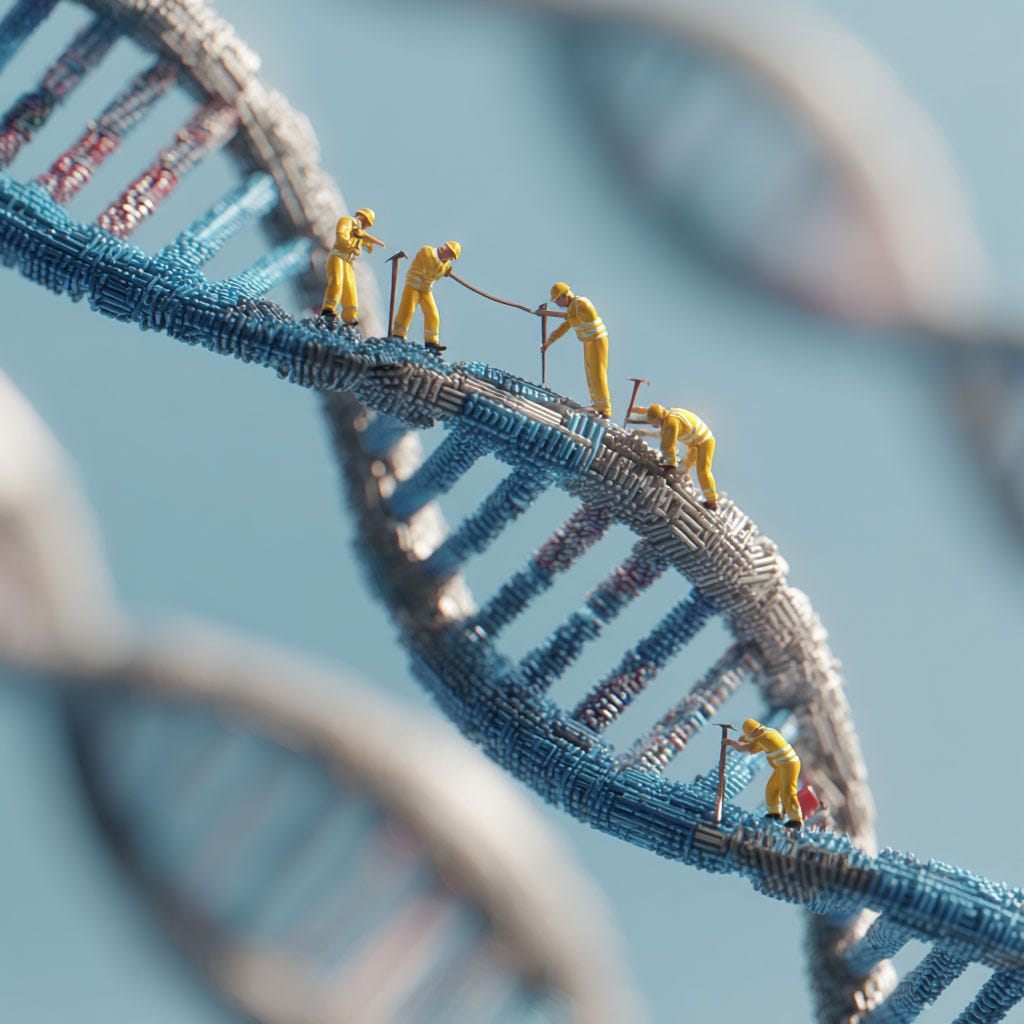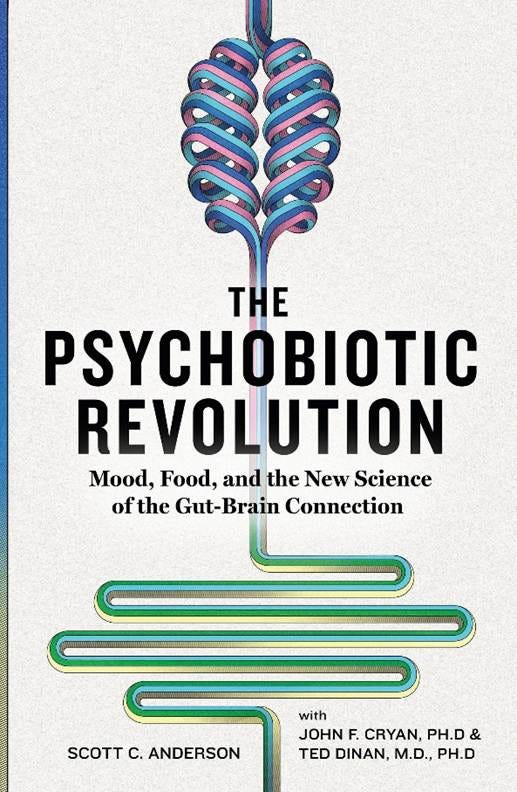Epigenetics and Development
If your genes represent the blueprint, epigenetics represent the construction crew.
The following is adapted from The Psychobiotic Revolution:
“Our genes might control the possibilities, but epigenetics determine our destiny.” —A.G. Riddle
Every cell in your body carries the same DNA. That’s your genetic inheritance gifted by your parents. But that basic scaffolding is nothing compared to the effects of epigenetics. The word means on top of genetics, and that’s an apt description of a molecule that actually sits on top of a gene, locking it up. The protein that gene described will no longer be made.
Epigenetics sounds pretty special, but it's really a commonplace. As a schoolkid, you learned how your 46 chromosomes contained the entire code needed to ripen a fertilized egg into something that becomes you. DNA, the long and winding molecule that creates your chromosomes, is your entire blueprint. Everything you need to specify the you-ness of you is in those 46 molecules. Half of those genes are from mom, and half from dad.
For the first few cell divisions after fertilization, these genes are studiously duplicated, and all the cells are the same. If we continued like that, we would grow up to be big blobs. Instead, even though our genes don’t change and every cell has a perfect copy, we start to create different cells — over a thousand different types.
Each chromosome contains code for anywhere from a few hundred to a few thousand genes. A human only needs about 20,000 working genes to make it get up and walk. That's an astonishingly small number of genes to create what humans humbly call the pinnacle of all animals. Weirdly, bullfrogs have twice the number of genes and some amoebas have over a hundred times as many genes as humans. Based on gene count alone, we might have to rethink our exalted position in the animal kingdom.
Development and cell differentiation
Heart cells don't need genes for producing insulin, and pancreas cells don't need genes to make muscles beat. How do they divvy up the jobs?
The answer is epigenetics: the ability to pick and choose which of the 20,000 genes to light up in any given cell. As you grow from a single fertilized egg, different layers of tissue start to develop. They differentiate by the simple expedient of turning some genes on and others off. This represents a higher level of control over genes — epigenetic — and it is the secret of multicellular life.
There are actually many different methods of switching genes on and off, some of them more permanent than others. Once a cell has committed to becoming a heart cell, you never want it to act like a pancreas or liver cell, so that is a lifetime epigenetic transformation.
Other epigenetic alterations are more temporary, responding to the current environment. One of these is called micro RNA, or miRNA, that can block a gene from producing its target protein for as long as the environment calls for it. It's typically a short-term effect, and when the miRNA is gone, the gene is free to work again.
The lack of certain proteins can alter physiology or behavior, including depression or anxiety. In one experiment, male mice pups were stressed by briefly taking their mothers away. This caused a change in the miRNA in parts of their brain, causing them to become the mouse version of depressed.
Another epigenetic change involves something called a methyl group that can be attached to DNA in such a way as to stop a gene cold. Interestingly, stress in young animals can cause corticosteroid receptor genes to be methylated, meaning that these receptors are no longer produced. With no receptor to tag up to, cortisol levels rise, leading to an increased sensitivity to stress that can last through adulthood.
Remember to hug your kids on occasion.
Now to burn it in
Where it gets interesting is when the depression-inducing miRNA is found in the mouse's sperm. When this particular miRNA is passed down by the sperm to the ovum at fertilization, research has shown that these same genes may be silenced or muted in the resulting pups.
This can cause a pup to act just like his dad, with a blunted stress response. In other words, the stress-induced depression is passed down to the next generation. More amazingly, there may still be noticeable effects on the generation after that, although this is still controversial.
To prove that this particular miRNA was the "depression molecule" the researchers purified some and injected it into unrelated mice. The male pups showed the same depressed behavior.
There are still a lot of questions about the mechanics of this kind of epigenetic change, but it demonstrates that some types of depression may be epigenetic in origin, and perhaps you can partly blame your dad. It's possible that psychobiotics — probiotics that improve your mood — won't work on these people, since the problem seems unrelated to microbes.
But there are many threads in the tapestry of depression, and you can't always predict what will happen when you try to pull just one of them. Studies by John Cryan and Ted Dinan have already demonstrated that the microbiome can be affected by stress, and that the microbiome can cause epigenetic effects in the brains of mice. It's difficult to completely rule out the microbiota.
Epigenetic triggers
What initiates these epigenetic changes? Researchers speculate that changes in the environment trigger epigenetic changes that allow the animal to better react to the situation. The two best-known examples of these miRNA regimes taking over include stress and starvation.
If you are being chased by a lion on a daily basis (or you have a boss who drives you crazy) you may want to alter your stress hormones to better deal with it without having a heart attack. MiRNAs are the perfect solution: you get to keep your genetic defaults, but you can shut down some of your stress responses to prevent them from going into overdrive.
If you are starved for a long enough time, you may lay down some epigenetic changes designed to help you eke the most out of your meager pickings. Passing down that legacy will be helpful to your children if they are also starved. It may be problematic, however, if your children enjoy a daily cornucopia. Obesity has followed periods of starvation, such as when the Germans starved the Dutch in WWII.
With epigenetics, horrible events like the holocaust can echo down through the generations. The children of holocaust survivors have altered quantities of stress hormones circulating in their blood, predisposing them to anxiety and depression. These epigenetic changes have also been linked to IBS, which is highly correlated to depression.
The idea that alterations in the environment can create heritable genetic changes sounds a lot like the ideas of Jean-Baptiste Lamarck, a French biologist who speculated in the late 1700s about evolution. He thought that the long neck of a giraffe could be explained by genetic changes passed down from mothers or fathers reaching for the tasty leaves on the higher branches. Lamarck is often ridiculed in biology for this "just-so" story, but epigenetic changes may offer a sneaky backdoor way to bring about very similar effects.
Next week, we’ll talk about fertilization. Yes, microbes play a role here too.
References
Franklin, Tamara B., Holger Russig, Isabelle C. Weiss, Johannes Gräff, Natacha Linder, Aubin Michalon, Sandor Vizi, and Isabelle M. Mansuy. “Epigenetic Transmission of the Impact of Early Stress Across Generations.” Biological Psychiatry 68, no. 5 (September 2010): 408–15. doi:10.1016/j.biopsych.2010.05.036.
Dinan, Timothy G., and John F. Cryan. “Regulation of the Stress Response by the Gut Microbiota: Implications for Psychoneuroendocrinology.” Psychoneuroendocrinology 37, no. 9 (2012): 1369–78. https://doi.org/10.1016/j.psyneuen.2012.03.007.
This is the bestselling book I wrote with the top two scientists in the field: John F. Cryan and Ted Dinan. They are simply brilliant, and are changing the world one psyche at a time! From National Geographic.




Thank you! I think we're going to be hearing a lot more about epigenetics in the near future. And the idea that microbes can induce epigenetic effects in the brain is, well, mind-boggling!
OK...that's it. I'm buying your book. Your posts resonate with me in ways that so many others don't. As always...thank you.